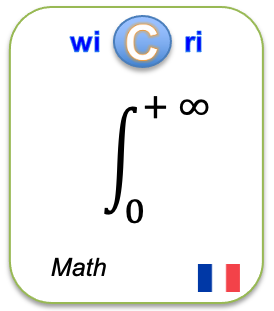Divisibility; Ordered Fields
Identifieur interne : 002589 ( Istex/Curation ); précédent : 002588; suivant : 002590Divisibility; Ordered Fields
Auteurs : Nicolas BourbakiSource :
Abstract
Abstract: The elementary arithmetical operations, and especially the calculus of fractions, could not but lead to numerous empirical verifications of the divisibility of whole numbers. But neither the Babylonians (however so expert at Algebra), nor the Egyptians (in spite of their acrobatic calculations with fractions) seem to have known any general rules governing these properties, and it is to the Greeks that the initiative returns here. Their arithmetic work, of which a masterly exposition is found in Books VII and IX of Euclid [107], does not yield pride of place to any of their most beautiful discoveries in the other branches of mathematics. The existence of the H.C.D. of two integers is proved already at the beginning of Book VII by the procedure known under the name of “Euclid’s algorithm”;1 it serves as a foundation for all ulterior developments (properties of prime numbers, existence and calculation of the L.C.M., etc.); and the crowning of the structure is formed by the two remarkable theorems proving the existence of an infinity of prime numbers (Book IX, prop. 20) and giving a procedure for constructing perfect even numbers starting with certain prime numbers (this procedure gives in fact all the even perfect numbers, as Euler was to prove).
Url:
DOI: 10.1007/978-3-642-61693-8_6
Links toward previous steps (curation, corpus...)
- to stream Istex, to step Corpus: Pour aller vers cette notice dans l'étape Curation :002589
Links to Exploration step
ISTEX:B75670642D9F54B39C4371EACC353611669D2425Le document en format XML
<record><TEI wicri:istexFullTextTei="biblStruct"><teiHeader><fileDesc><titleStmt><title xml:lang="en">Divisibility; Ordered Fields</title><author><name sortKey="Bourbaki, Nicolas" sort="Bourbaki, Nicolas" uniqKey="Bourbaki N" first="Nicolas" last="Bourbaki">Nicolas Bourbaki</name></author></titleStmt><publicationStmt><idno type="wicri:source">ISTEX</idno><idno type="RBID">ISTEX:B75670642D9F54B39C4371EACC353611669D2425</idno><date when="1994" year="1994">1994</date><idno type="doi">10.1007/978-3-642-61693-8_6</idno><idno type="url">https://api.istex.fr/document/B75670642D9F54B39C4371EACC353611669D2425/fulltext/pdf</idno><idno type="wicri:Area/Istex/Corpus">002589</idno><idno type="wicri:explorRef" wicri:stream="Istex" wicri:step="Corpus" wicri:corpus="ISTEX">002589</idno><idno type="wicri:Area/Istex/Curation">002589</idno></publicationStmt><sourceDesc><biblStruct><analytic><title level="a" type="main" xml:lang="en">Divisibility; Ordered Fields</title><author><name sortKey="Bourbaki, Nicolas" sort="Bourbaki, Nicolas" uniqKey="Bourbaki N" first="Nicolas" last="Bourbaki">Nicolas Bourbaki</name></author></analytic><monogr></monogr></biblStruct></sourceDesc></fileDesc><profileDesc><textClass></textClass><langUsage><language ident="en">en</language></langUsage></profileDesc></teiHeader><front><div type="abstract" xml:lang="en">Abstract: The elementary arithmetical operations, and especially the calculus of fractions, could not but lead to numerous empirical verifications of the divisibility of whole numbers. But neither the Babylonians (however so expert at Algebra), nor the Egyptians (in spite of their acrobatic calculations with fractions) seem to have known any general rules governing these properties, and it is to the Greeks that the initiative returns here. Their arithmetic work, of which a masterly exposition is found in Books VII and IX of Euclid [107], does not yield pride of place to any of their most beautiful discoveries in the other branches of mathematics. The existence of the H.C.D. of two integers is proved already at the beginning of Book VII by the procedure known under the name of “Euclid’s algorithm”;1 it serves as a foundation for all ulterior developments (properties of prime numbers, existence and calculation of the L.C.M., etc.); and the crowning of the structure is formed by the two remarkable theorems proving the existence of an infinity of prime numbers (Book IX, prop. 20) and giving a procedure for constructing perfect even numbers starting with certain prime numbers (this procedure gives in fact all the even perfect numbers, as Euler was to prove).</div></front></TEI></record>Pour manipuler ce document sous Unix (Dilib)
EXPLOR_STEP=$WICRI_ROOT/Wicri/Mathematiques/explor/BourbakiV1/Data/Istex/Curation
HfdSelect -h $EXPLOR_STEP/biblio.hfd -nk 002589 | SxmlIndent | more
Ou
HfdSelect -h $EXPLOR_AREA/Data/Istex/Curation/biblio.hfd -nk 002589 | SxmlIndent | more
Pour mettre un lien sur cette page dans le réseau Wicri
{{Explor lien
|wiki= Wicri/Mathematiques
|area= BourbakiV1
|flux= Istex
|étape= Curation
|type= RBID
|clé= ISTEX:B75670642D9F54B39C4371EACC353611669D2425
|texte= Divisibility; Ordered Fields
}}
|
| This area was generated with Dilib version V0.6.33. | |



